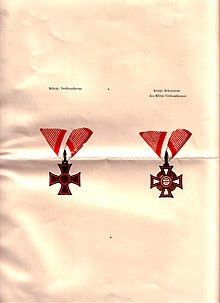Ferenc József Gyulay
Ferenc József Gyulay, Count of Maros-Németh and Nádaska (born September 1, 1798 in Pest , † September 1, 1868 in Vienna ) was a Hungarian field master and commander in chief of the Austrian troops in the Sardinian War .
Life
Ferenc Gyulay (also Gyulai) Count of Maros-Németh and Nádaska came from an old Transylvanian family that had been ennobled since 1701 and then split into an older Catholic and a younger Reformed line. He was the only son of the Imperial Austrian Field Marshal Lieutenant Ignác Gyulay (1763-1831).
Early career
Gyulay entered Austrian military service in 1816 and was made a second lieutenant in Infantry Regiment No. 60 at the age of 16. He was then transferred to the hussars (Kaiser-Uhlanen) and promoted to major in September 1827 . Soon after, he was promoted to colonel and was appointed leader of the 19 Infantry Regiment. On August 20, 1837 he was promoted to major general , after which he took over a brigade stationed in St. Pölten . In 1845 he was given ownership of the 33rd Infantry Regiment and on March 27, 1846 he was promoted to Lieutenant Field Marshal . The latter increase was connected with the appointment as divisional officer and military commander of Trieste .
In the Italian Revolutionary War 1848/49
After the outbreak of the Italian Revolution and the Piedmontese War (March 1848) he was appointed governor of the coastal country . At the crucial moment he secured not only the imperial naval units in the various stations of Dalmatia with his organizational talent, but also the ships already on their way to the fallen Venice and the units stationed outside the Adriatic . He had important defense arrangements made for the important naval bases of Trieste, Pula and Pirano and prepared the counter-offensive, which became possible from mid-April after the arrival of the inner Austrian reinforcements under Feldzeugmeister Graf Nugent . On May 23, 1848, the Sardinian fleet appeared before Trieste and attempted the coup in vain; Gyulay's artillery installations were so efficiently set up that the enemy refrained from attacking and finally withdrew on July 4th. Gyulay was awarded the Commander's Cross of the St. Stephen's Order and later the Grand Cross of the Leopold Order . He then administered the War Ministry from June 1849 to July 1850 and then went to Milan as Commander of the 5th Corps , where he was appointed Feldzeugmeister on November 2, 1850, and from where he carried out diplomatic assignments to the Italian courts and to Petersburg was posted.
In the Italian War 1859
When the Sardinian War broke out in early 1859, Gyulay was appointed Commander-in-Chief of the Austrian troops in Italy and Governor-General of Lombardy.
After he opened the war on April 29th by crossing the Ticino , he stayed, instead of attacking Turin immediately or turning against Novi, in order to block the only road on which the French, bypassing the Alps, bring help were able to stand in the Lomellina because the requested reinforcements did not arrive, and gave Napoleon two full weeks to arrive with his armed forces on the theater of war.
When the first skirmishes, at Montebello and Palestro , were unfortunate, Gyulay went back over the Ticino and expected the enemy to attack him from the Po.
However, this turned by a flank march behind the Sardinian army against the Ticino and crossed this at Turbigo and Buffalora ; on June 4th the battle of Magenta broke out , in which the Austrian army parts used too sporadically on the battlefield had to give way to the concentric attack of the allies. Gyulay immediately vacated Milan and all points occupied on the Po and withdrew behind the Mincio.
He was then replaced on June 16 by Heinrich von Hess as Commander in Chief and later retired as Feldzeugmeister. He succeeded in refuting some of the memoranda that he had issued, in some cases exaggerated accusations against his behavior before and during the Battle of Magenta, and in particular in justifying his adherence to the Ticino line with orders from Vienna. Gyulay died childless in Vienna on September 1, 1868, after adopting his cousin, General Leopold von Edelsheim , who now took his name.
literature
- Constantin von Wurzbach : Gyulay von Maros-Németh and Nadaska, Franz (VI.) Graf . In: Biographisches Lexikon des Kaiserthums Oesterreich . 6th part. Imperial and Royal Court and State Printing Office, Vienna 1860, pp. 70–77 ( digitized version ).
- von Hoffinger: Gyulai, Franz Graf von . In: Allgemeine Deutsche Biographie (ADB). Volume 10, Duncker & Humblot, Leipzig 1879, pp. 250-252.
- Meyers Konversations-Lexikon , 5th edition, Bibliographisches Institut, Leipzig and Vienna, 1894
- Gyulai von Maros-Németh and Nádaska Franz Graf. In: Austrian Biographical Lexicon 1815–1950 (ÖBL). Volume 2, Publishing House of the Austrian Academy of Sciences, Vienna 1959, p. 114 f. (Direct links on p. 114 , p. 115 ).
| personal data | |
|---|---|
| SURNAME | Gyulay, Ferenc József |
| ALTERNATIVE NAMES | Gyulay, Franz von; Count Franz Gyulay of Maros-Németh and Nádaska |
| BRIEF DESCRIPTION | Austro-Hungarian general |
| DATE OF BIRTH | September 1, 1798 |
| PLACE OF BIRTH | Plague (city) |
| DATE OF DEATH | September 1, 1868 |
| Place of death | Vienna |




